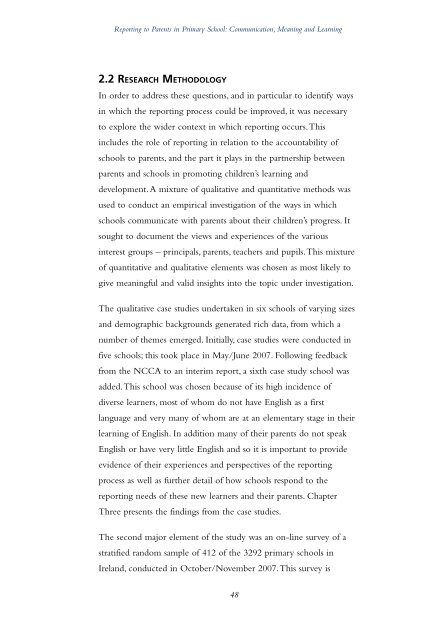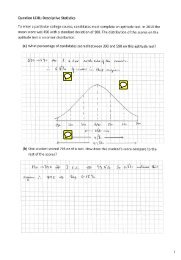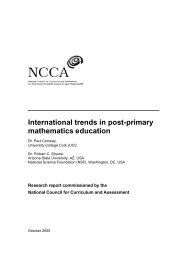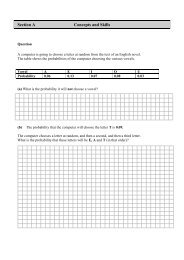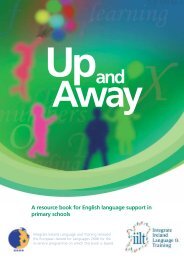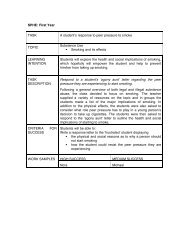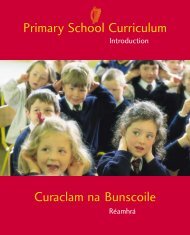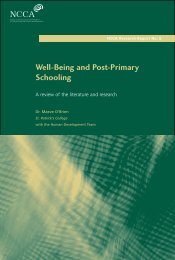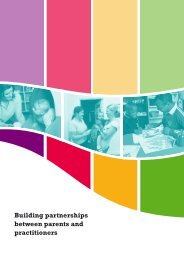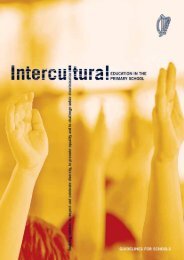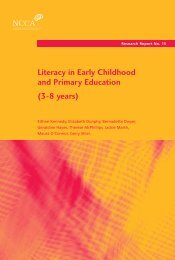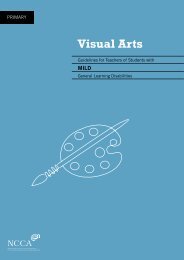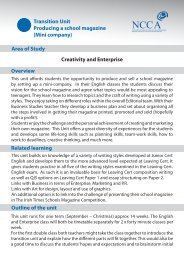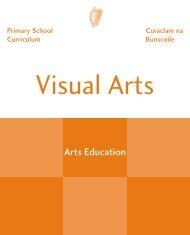Reporting to Parents in Primary School: Communication, Meaning ...
Reporting to Parents in Primary School: Communication, Meaning ...
Reporting to Parents in Primary School: Communication, Meaning ...
You also want an ePaper? Increase the reach of your titles
YUMPU automatically turns print PDFs into web optimized ePapers that Google loves.
<strong>Report<strong>in</strong>g</strong> <strong>to</strong> <strong>Parents</strong> <strong>in</strong> <strong>Primary</strong> <strong>School</strong>: <strong>Communication</strong>, Mean<strong>in</strong>g and Learn<strong>in</strong>g<br />
2.2 rESEarch mEthodology<br />
In order <strong>to</strong> address these questions, and <strong>in</strong> particular <strong>to</strong> identify ways<br />
<strong>in</strong> which the report<strong>in</strong>g process could be improved, it was necessary<br />
<strong>to</strong> explore the wider context <strong>in</strong> which report<strong>in</strong>g occurs. This<br />
<strong>in</strong>cludes the role of report<strong>in</strong>g <strong>in</strong> relation <strong>to</strong> the accountability of<br />
schools <strong>to</strong> parents, and the part it plays <strong>in</strong> the partnership between<br />
parents and schools <strong>in</strong> promot<strong>in</strong>g children’s learn<strong>in</strong>g and<br />
development. A mixture of qualitative and quantitative methods was<br />
used <strong>to</strong> conduct an empirical <strong>in</strong>vestigation of the ways <strong>in</strong> which<br />
schools communicate with parents about their children’s progress. It<br />
sought <strong>to</strong> document the views and experiences of the various<br />
<strong>in</strong>terest groups – pr<strong>in</strong>cipals, parents, teachers and pupils. This mixture<br />
of quantitative and qualitative elements was chosen as most likely <strong>to</strong><br />
give mean<strong>in</strong>gful and valid <strong>in</strong>sights <strong>in</strong><strong>to</strong> the <strong>to</strong>pic under <strong>in</strong>vestigation.<br />
The qualitative case studies undertaken <strong>in</strong> six schools of vary<strong>in</strong>g sizes<br />
and demographic backgrounds generated rich data, from which a<br />
number of themes emerged. Initially, case studies were conducted <strong>in</strong><br />
five schools; this <strong>to</strong>ok place <strong>in</strong> May/June 2007. Follow<strong>in</strong>g feedback<br />
from the NCCA <strong>to</strong> an <strong>in</strong>terim report, a sixth case study school was<br />
added. This school was chosen because of its high <strong>in</strong>cidence of<br />
diverse learners, most of whom do not have English as a first<br />
language and very many of whom are at an elementary stage <strong>in</strong> their<br />
learn<strong>in</strong>g of English. In addition many of their parents do not speak<br />
English or have very little English and so it is important <strong>to</strong> provide<br />
evidence of their experiences and perspectives of the report<strong>in</strong>g<br />
process as well as further detail of how schools respond <strong>to</strong> the<br />
report<strong>in</strong>g needs of these new learners and their parents. Chapter<br />
Three presents the f<strong>in</strong>d<strong>in</strong>gs from the case studies.<br />
The second major element of the study was an on-l<strong>in</strong>e survey of a<br />
stratified random sample of 412 of the 3292 primary schools <strong>in</strong><br />
Ireland, conducted <strong>in</strong> Oc<strong>to</strong>ber/November 2007. This survey is<br />
48


